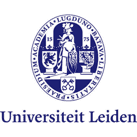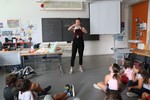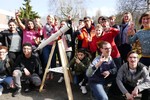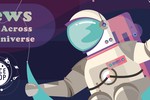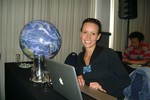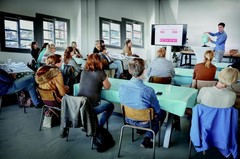Science education project Space Awareness engaged 230,000 people in 68 countries with the excitement and challenges of space sciences and technologies. After three years, the project coordinated by Leiden Observatory came to an end in March and has now been evaluated.
The project has raised the interest of young people in science, technology and career opportunities offered by the space industry. Space Awareness created and implemented 160 activities, such as local teacher trainings, an international Space Education Conference and 2 summer schools. Partners from 23 countries across Europe and Africa participated in the project.
Educational resources and teacher training
In these three years, the Space Awareness team developed and distributed 305 high-quality educational resources. Here are some examples of these resources:
- The Climate Box: a low-cost, hands-on educational toolkit that teaches children about our climate, climate change and the habitability of other planets.
- The Journey of Ideas: a toolkit that showcases the history and accomplishments of Islamic science and technology. The innovative tool tells the story of a shared history based on creativity, tolerance and respect for other cultures. Furthermore, it provides hands-on educational resources to familiarise teenagers with the immensely important contributions that scientists from North Africa and the Middle East made to the field of science and culture. With this toolkit European and global citizenship was stimulate, one of the main goals of the project.
- Four Massive Online Open Courses (MOOCs) to train teachers. The team delivered the MOOCs to more than 2,400 educators from 68 countries. All participated in at least one of these courses.
- Space Awareness hosted a 5-day International Space Education conference in 2016, in collaboration with the European Space Agency and the Galileo Teacher Training Programme. This event brought together about 100 professional educators.
- A Space Career booklet which provides a compilation of information about space careers and relevant employers. According to the independent reviewer appointed by the European Union, the careers booklet offers ‘a good representation of role models for young people interested in the space industry’.

Adults learn about astronomy and space in a Space Awareness workshop
Long-term impact
To ensure long-term impact, the resources were translated into several languages to make them accessible in classrooms worldwide. The Commision’s independent reviewer stated: ‘The project has delivered exceptional results with significant immediate or potential impact.’ In her report, she emphasised that the added value of the platform is that it offers educational resources to educators. ‘[...] This has resulted in creating a ‘best in class’ portal hosting high quality and accessible, attractive peer-reviewed resources that are designed with the classroom teacher in mind.’
Space Awareness has shown that space is an extremely effective tool for motivating and educating children and teenagers, fostering fundamental values of tolerance and engaging the public in science, technology and innovation. Such public engagement also helps to inform the public that support for scientific research and technological innovation are important for the future of our society.
The European Commission also wrote an article about Space Awareness. You can find it here: European youth encouraged to reach for the stars.
Space Awareness Partners
Funded by European Union's Horizon 2020, Space Awareness was a partnership between:
Ciência Viva, Portugal;
Ellinogermaniki Agogi, Greece;
Ecsite, Belgium;
European Schoolnet, Belgium;
Haus der Astronomie, Germany;
National Research Foundation, South Africa;
Leiden University, the Netherlands;
Nuclio, Portugal;
The Open University, United Kingdom and
University College London, United Kingdom.
Links
- For more information, please visit the Space Awareness website.


